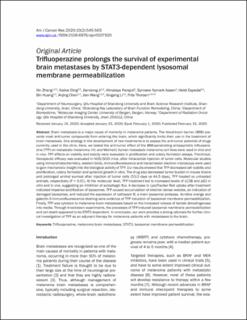| dc.description.abstract | Brain metastasis is a major cause of mortality in melanoma patients. The blood-brain barrier (BBB) prevents most anti-tumor compounds from entering the brain, which significantly limits their use in the treatment of brain metastasis. One strategy in the development of new treatments is to assess the anti-tumor potential of drugs currently used in the clinic. Here, we tested the anti-tumor effect of the BBB-penetrating antipsychotic trifluoperazine (TFP) on metastatic melanoma. H1 and Melmet1 human metastatic melanoma cell lines were used in vitro and in vivo. TFP effects on viability and toxicity were evaluated in proliferation and colony formation assays. Preclinical, therapeutic efficacy was evaluated in NOD/SCID mice, after intracardial injection of tumor cells. Molecular studies using immunohistochemistry, western blots, immunofluorescence and transmission electron microscopy were used to gain mechanistic insight into the biological activity of TFP. Our results showed that TFP decreased cell viability and proliferation, colony formation and spheroid growth in vitro. The drug also decreased tumor burden in mouse brains and prolonged animal survival after injection of tumor cells (53.0 days vs 44.5 days), TFP treated vs untreated animals, respectively (P < 0.01). At the molecular level, TFP treatment led to increased levels of LC3B and p62 in vitro and in vivo, suggesting an inhibition of autophagic flux. A decrease in LysoTracker Red uptake after treatment indicated impaired acidification of lysosomes. TFP caused accumulation of electron dense vesicles, an indication of damaged lysosomes, and reduced the expression of cathepsin B, a main lysosomal protease. Acridine orange and galectin-3 immunofluorescence staining were evidence of TFP induction of lysosomal membrane permeabilization. Finally, TFP was cytotoxic to melanoma brain metastases based on the increased release of lactate dehydrogenase into media. Through knockdown experiments, the processes of TFP-induced lysosomal membrane permeabilization and cell death appeared to be STAT3 dependent. In conclusion, our work provides a strong rationale for further clinical investigation of TFP as an adjuvant therapy for melanoma patients with metastases to the brain. | en_US |

